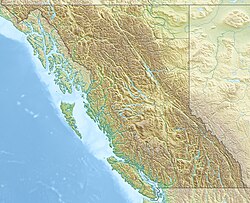| Mount Fraser | |
|---|---|
 West aspect of Mount Fraser at top. (View from Mt. Edith Cavell. Throne in foreground) | |
| Highest point | |
| Elevation | 3,322 m (10,899 ft) [1] [2] [3] |
| Prominence | 1,173 m (3,848 ft) [4] |
| Parent peak | Mount Edith Cavell (3363 m) [4] |
| Listing | |
| Coordinates | 52°39′23″N118°19′09″W / 52.6563°N 118.3191°W [5] |
| Geography | |
| Country | Canada |
| Provinces | Alberta and British Columbia |
| Protected areas | Jasper National Park Mount Robson Provincial Park |
| Parent range | Park Ranges |
| Topo map | NTS 83D9 Amethyst Lakes [5] |
| Climbing | |
| First ascent | Sunday, July 13, 1924 A.J. Ostheimer, Strumia, Thorington, Conrad Kain [4] [1] [3] |
Mount Fraser is a mountain located on the border of Alberta and British Columbia. It is Alberta's 38th highest peak and Alberta's 22nd most prominent mountain. It is also British Columbia's 50th highest peak. [4] It was named in 1917 after Simon Fraser. [1] [4]
Contents
The massif consists of three peaks: [1]
| Peak | Elevation | Coordinates |
|---|---|---|
| Simon Peak | 3,322 m (10,899 ft) | 52°39′23″N118°19′09″W / 52.6563°N 118.3191°W |
| Bennington Peak | 3,265 m (10,712 ft) | 52°39′17″N118°17′53″W / 52.6547°N 118.2980°W [6] |
| McDonnell Peak | 3,261 m (10,699 ft) | 52°39′05″N118°18′22″W / 52.65133°N 118.30615°W [7] |


